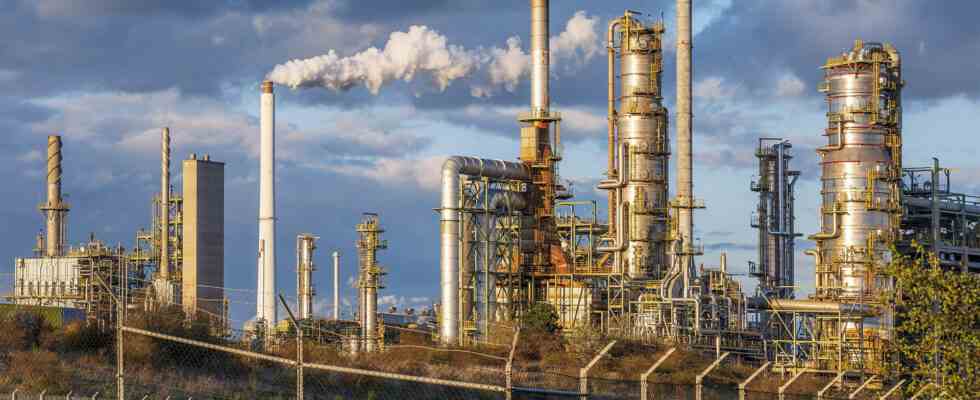Status: 12/29/2022 11:42 a.m
As of this month, no more tanker oil may be imported from Russia. From January 1st, the ban on imports via pipelines will also take effect. According to the mineral oil industry, the supply is nevertheless secured.
According to the mineral oil industry, Germany has coped well with the oil embargo against Russia and is also prepared for the import ban for pipeline oil on January 1st. “Germany’s crude oil supply is also secured in the coming year,” said Christian Küchen, general manager of the Fuels and Energy trade association, of the German Press Agency in Berlin.
“The German mineral oil industry has successfully overcome the EU embargo against Russian crude oil imports by sea, which it supported,” emphasized Küchen. Russian supplies have primarily been replaced by crude oil from the North Sea, the US and Kazakhstan. “The industry has also taken precautions for the end of December import stop on the land route via pipeline.”
Import bans on Russian tanker and pipeline oil
The embargo on Russian oil delivered by tanker, agreed in the European Union in May, has been in force since December 5th. The aim is to make it more difficult for Russia to finance the war of aggression against Ukraine. Poland and Germany had voluntarily declared that they would also refrain from using Russian pipeline oil. At present, a good two thirds of the imported Russian oil comes to the EU via tankers, the rest via pipelines.
The pipeline import freeze takes effect on January 1st and primarily affects the two east German refineries in Leuna in Saxony-Anhalt and in Schwedt in Brandenburg. While Leuna quickly reoriented itself and received around half of the processed oil from the North Sea or the Persian Gulf in the summer, the federal government only recently named new delivery routes for PCK Schwedt.
“For the East German PCK refinery, which has so far only been supplied from Russia, the federal government has guaranteed continued operation,” said Küchen. “The first crude oil deliveries via the port of Rostock have arrived and been processed.” According to the federal government, the plant will be supplied with oil primarily from Poland from January onwards, as Michael Kellner, State Secretary in the Federal Ministry of Economics, recently announced.
Poland pledges 70 percent utilization of PCK refinery
According to this, Poland has pledged to supply enough crude oil from the beginning of the year to use the Schwedt plant at 70 percent capacity. In addition, the shareholders of the refinery tried to get supply contracts with Kazakhstan. According to Kellner, they are negotiating larger delivery quantities, smaller deliveries have already been agreed.
The PCK refinery is important for supplying fuel to the filling stations in the greater Berlin area and large parts of north-eastern Germany. State Secretary Kellner does not assume that the change in oil deliveries will have a major impact on fuel prices. It will be noticeable, but he doesn’t expect any “huge price swings”.
So far, the plant has been supplied primarily with crude oil from the Russian state-owned company Rosneft via the Druzhba pipeline. The group also owns the majority of the refinery, which is currently under German trusteeship. Alternatively, it can be supplied with oil through existing pipelines via the ports of Rostock and Gdansk.
Russia imposes a sales ban on countries with a price cap
In addition to new supply relationships, the petroleum industry is increasingly focusing on the provision of climate-friendly energy sources. This includes, for example, hydrogen. Industry representative Küchen emphasized: “We could be faster in the transformation and even more technological pioneers than we are now if politics and regulation in Europe and Germany didn’t keep slowing us down.”
On Tuesday, Russian President Vladimir Putin issued a decree banning the sale of oil to countries that have decided on a price cap on the raw material. The ban on oil shipments comes into effect on February 1. Even before the EU decision, Moscow had made it clear that it rejected the price cap. The Russian leadership speaks of a violation of the free market and has been announcing countermeasures for weeks. The ban was therefore expected.
The price cap was introduced in addition to the oil embargo. It is intended to prevent Russia from circumventing the sanctions and selling the raw material to other countries at the prevailing market price. The EU decided on the measure at the beginning of December, and the G7 countries, Australia and Norway have joined.
EU oil embargo in force for almost four weeks
Jakob Mayr, ARD Brussels, December 29, 2022 11:17 a.m

